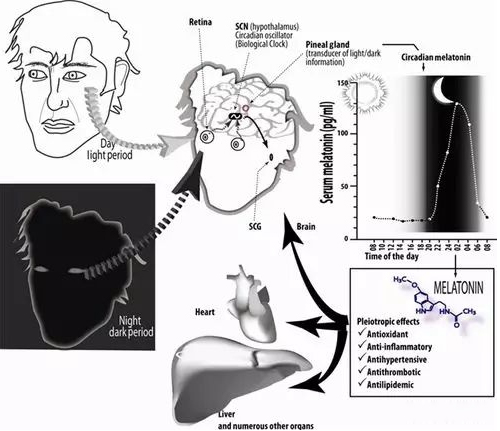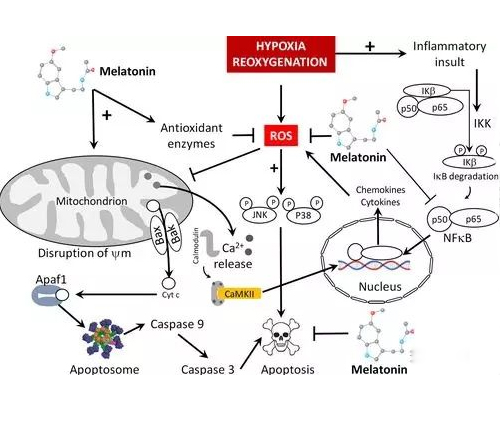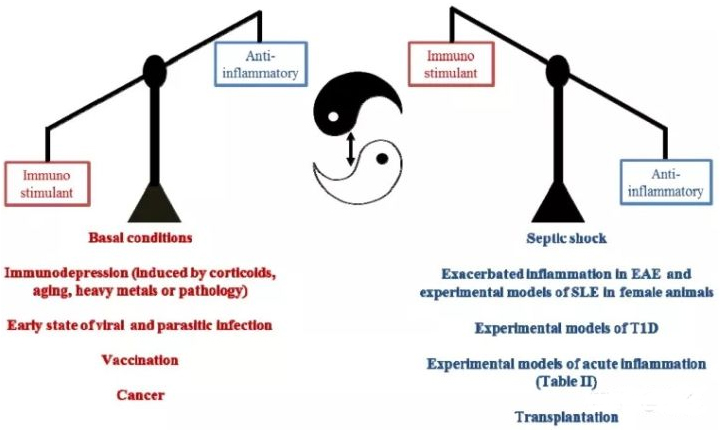Categories
- Blog (60)
Many people know that melatonin is a sleep hormone. It is secreted in large quantities at night and regulates our sleep rhythm. But what many people don’t know is that sleep aids are just one of the many effects of melatonin.
In addition to aiding sleep, melatonin is also a powerful antioxidant – anti-aging and immune-modulating. Also, melatonin is essential for the repair of the digestive system.
Next, we will re-understand melatonin together.
① Melatonin, scientifically known as N-acetyl-5-methoxytryptamine, is a hormone that regulates the sleep-wake cycle.
Melatonin is secreted by the pineal gland in the brain; however, our bone marrow, retina, and digestive tract also produce melatonin.
② The secretion of melatonin from the pineal gland is controlled by the central biological clock; therefore, the level of melatonin in the human body exhibits a significant circadian rhythm.
Melatonin levels are low during the day; Melatonin secretion increases at night.
In fact, melatonin levels in the blood at night are 10-15 times higher than during the day.
③ There are two main types of melatonin receptors in the cells of our body, one is melatonin receptor 1 (MT1) and the other is melatonin receptor 2 (MT2).
There is a regulatory effect of melatonin in the human brain, retina, liver, kidney, digestive tract, skin and immune cells.
The particular topics are the antioxidant mechanisms of melatonin, its regulatory effects on the immune system, and its effects on the digestive system among all topics.

① Excessive free radicals can cause cell damage, thereby accelerating aging. Melatonin can increase antioxidant enzymes in cells, including superoxide dismutase, glutathione peroxidase, and glutamylcysteine synthase. These enzymes help protect cells and mitochondria from free radical damage.
② In addition, melatonin can directly combine with active oxygen free radicals and active nitrogen free radicals, making these free radicals less harmful. Under the protection of melatonin, cells and mitochondria are less prone to apoptosis.
③ Melatonin has an important protective effect on DNA and can prevent it from being damaged by heavy metals.
Also, melatonin outperforms many common antioxidants, such as alpha-lipoic acid, catechol, and resveratrol.

④ The health of our brains, eyes, gut, bone marrow, ovaries and testes depends on the antioxidant mechanism of melatonin.
⑤ Some antioxidants, including alpha-lipoic acid, vitamin E and vitamin D3, plus melatonin, can have a synergistic effect of 1+1>2.
⑥ Not only melatonin itself, but also the metabolites of melatonin often have antioxidant effects.
For example, 6-Hydroxymelatonin, a metabolite of melatonin, has powerful neuroprotective effects.
From this point of view, the antioxidant capacity of melatonin is “passed from generation to generation”.
① Numerous immune cells have receptors for melatonin, including CD4+ T cells, CD8+ T cells and B cells.
② The balance of Th1 cells and Th2 cells is essential to maintain the health of the immune system; and melatonin can maintain this balance.
③ The regulation of melatonin on the immune system is bidirectional.
When the immune system is insufficient, it can activate the immune system, and in the case of an inflammatory response, it can play an anti-inflammatory role.
④ Melatonin can inhibit the production of various inflammatory factors, including IL-6, IL-1β, TNF-alpha, NF-kB and nitric oxide.
⑤ Melatonin plays an important role in many autoimmune diseases. In type 1 diabetes, multiple sclerosis, and inflammatory bowel disease, melatonin acts to reduce inflammation.
However, in rheumatoid arthritis, melatonin may slightly increase inflammation levels.

① Although melatonin is synthesized by the pineal gland, in fact, the melatonin content in the digestive tract is the most.
② Melatonin in the digestive tract is synthesized by enterochromaffin cells, and its concentration is about 10-100 times that in the blood, and the total content is about 400 times that in the pineal gland.
③ As we said above, melatonin has a powerful antioxidant function, and this function may have important significance for the repair of the digestive tract.
④ Studies have found that melatonin can accelerate wound healing in both aspirin-induced gastric ulcers and Helicobacter pylori-induced gastric ulcers.
⑤ In studies of gastroesophageal reflux disease, 3 mg of melatonin per night also helped relieve symptoms.
Although not as effective as the prescription drug omeprazole, the two work synergistically when used together.
⑥ In the study of irritable bowel syndrome, it was found that melatonin (3mg per night in most trials) can effectively relieve the symptoms of abdominal pain.
⑦ However, research on melatonin in the digestive tract is quite limited.
But we have reason to believe that this hormone, which is abundantly produced in the gut, must have important physiological significance.
① How can I increase my level of melatonin to get the benefits it brings? There are mainly two directions: (1) eat directly, (2) rely on the body to synthesize.
② Some plants contain a small amount of melatonin, such as:
Tomato (3-114ng/g), Cherry (2.06-13.46ng/g), Walnut (3-4ng/g), Strawberry (1-11ng/g), Olive Oil (53-119pg/ml)
PS: 1ng = 10^(-6)mg, 1pg=10^(-9)mg
Compared to melatonin supplement, these foods provide relatively small amounts.
Still, the study found that people who ate the most plants had 16 percent more melatonin in their urine than those who ate the least.

③ Oral melatonin supplementation is the most direct way.
The safety of melatonin is relatively good, and no significant adverse reactions have been found in both oral 240mg and injection 500mg. However, a small number of people experience drowsiness the next day after taking melatonin.
The dose of melatonin used will vary from trial to trial, but a general range of 0.2-5 mg is used. It’s effective that melatonin is usually best taken 1-2 hours before bedtime.
Use during the day may disrupt circadian rhythms and increase the risk of bipolar disorder and depression.
④ Of course, Most natural ways rely on the body to synthesize melatonin.
In order to ensure the synthesis of melatonin, on the one hand, you need to consume the nutrients needed to produce melatonin; on the other hand, you need to have a good circadian rhythm.
⑤ The precursor of melatonin is serotonin, and the precursor of serotonin is tryptophan.
To synthesize melatonin, you need to eat foods rich in tryptophan, such as chicken, fish, and milk.
In addition to this, folic acid, vitamin B6, magnesium and zinc are also important.
Folic acid and vitamin B6 can promote the production of serotonin from tryptophan; Magnesium and zinc boost the production of serotonin and melatonin.
⑥ The secretion of melatonin is strictly regulated by the body’s biological clock system.
Light at night, especially blue light, can significantly inhibit the secretion of melatonin.
In order to ensure the secretion of melatonin, it is best to turn off all lights as much as possible at least 1 hour before bedtime.
At the same time, all electronic devices should be adjusted to night mode.
Conclusion:
Melatonin is an underrated hormone.
As some scholars said ” it under promises but over delivers”.
-Not only is it a sleep hormone, but it is also an antioxidant, immunomodulatory and gut repair hormone.
-Melatonin affects numerous organs and tissues in the body.
-It protects cells, mitochondria and DNA from free radical damage.
-It regulates the immune system in both directions, boosting immunity or reducing inflammation when necessary.
-At the same time, it promotes the repair of the stomach and esophagus, and relieves painful symptoms of irritable bowel.
To increase melatonin levels, it is safe to supplement with melatonin, but a more natural approach is to calibrate your circadian rhythm.
Best Nutras has the products of Melatonin powder and melatonin supplement for customers’ choice. Welcome to send us an inquiry at [email protected] for our melatonin products.